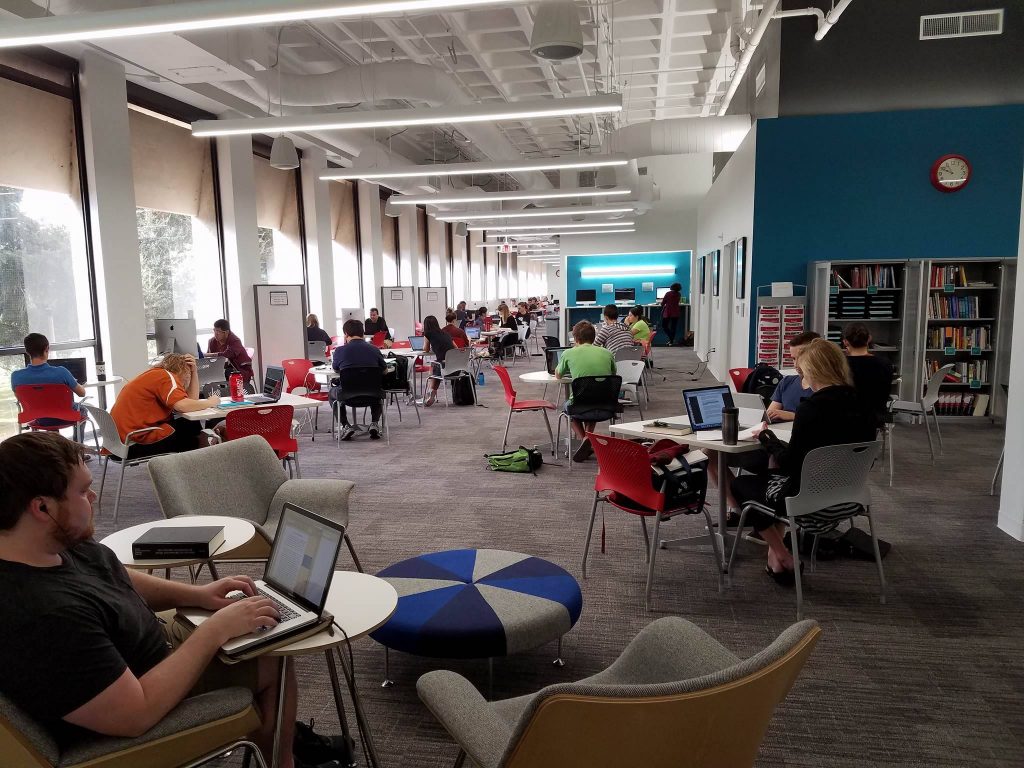
The UWC provides free programs to support and empower all UT graduate students as readers, writers, and communicators. Our trained graduate student consultants provide one-on-one feedback on any project at any stage of your writing process. We are happy to work with you on:
- Dissertation prospectuses
- Dissertation or thesis chapters
- Conference proposals and papers
- Abstracts
- Research papers
- Journal articles
- Research or personal statements for fellowship and grant applications
- Class assignments
- CVs and other career materials
For group accountability and writing instruction, check out our weekly writing groups, monthly workshops, and monthly Saturday writing retreats!
FAQs
How much do the UWC’s graduate services cost?
There is no charge for our services, which are generously supported by the Office of Graduate Studies and the College of Liberal Arts.
How often can I visit?
Graduate students can schedule up to four individual consultations per month.
Graduate students can schedule only one 45-minute consultation per day. This policy supports the UWC’s mission of helping writers to build independent writing and revision skills. It also ensures that our consultants will be available to meet with the multiple writers who seek our services each day.
Exceptions to this policy (longer appointments and multiple consecutive appointments) are available only as accommodations for students with disabilities. Visit our accessibility page to find out more.
What kinds of projects can I work on at the UWC?
Anything and everything! We offer support for seminar papers, Master’s theses, and dissertations, but we also work with all other sorts of projects, including: fellowship and grant applications, book reviews, teaching philosophy statements, dissertation acknowledgement pages, draft responses for qualifying exams, and emails to editors. If it’s a genre we’re not familiar with, we’ll draw on our in-house library and our colleagues to learn about it.
Who are UWC consultants?
Our Graduate Peer Consultants are advanced graduate students in a variety of fields of study. They are experienced academic writers and are trained in non-directive, non-evaluative consultation techniques.
Can I request a consultant from my own field of study?
The UWC employs 10-15 peer graduate consultants, so it is not possible for consultants to represent the full range of over 130 academic departments at UT. We welcome new consultants from all disciplines; please visit our Jobs page to apply to work with us.
Are consultants trained to work with multilingual writer concerns?
Yes, we frequently work with writers who are multilingual writers. For additional support, click here to learn about UT’s International Office and the resources they offer for multilingual writers.
Can consultants edit/proofread my writing?
Consultants are happy to provide help with sentence-level issues such as clarity, grammar, and correct usage, but we do not copy-edit or proofread writers’ drafts. Instead, we ask questions about your writing/revision goals and help you learn ways to meet those goals independently. For example, if you want to focus on improving grammar and punctuation, a UWC consultant may read a portion of your draft, identify main areas to focus on in revision (such as run-on sentences or comma usage), and work with you to practice sample revisions in those areas, using our handbooks and online resources for reference. Our goal is not to “fix” your draft, but to equip you with strategies that you can use to revise the draft yourself and continue using in future writing projects.
If you are interested in hiring an editor, visit our “Hire an Editor” page. We recommend searching Austin Freelancers or the national Editorial Freelancers Association (not affiliated with the UWC). For general guidance on copyediting services, we recommend Professor Wendy Laura Belcher’s overview: how to hire and work with an academic copyeditor.
Can consultants review drafts in advance of our meeting?
No, we can only work with drafts during consultations. Consultants can review up to 8 pages of writing during a consultation.
Can I request a consultation in a quiet room?
Yes. Upon request, the UWC offers consultations in Reduced Distraction Rooms. You can indicate your preference for a Reduced Distraction Room when you check in on the day of your appointment.
Does the UWC offer accommodations for students with disabilities?<br>
Yes. Click here to learn more about accessibility at the UWC.
How can I find out about working at the UWC?<br>
We employ graduate students from all departments as consultants. Our consultants receive initial and ongoing training in consultation techniques, including training for working with English Language Learners (ELL). They also participate in activities that develop their professional skills, such as research, community outreach, public speaking, and editing for publication. To learn more about working with us, visit our Jobs page.
Can I join a UWC Writing Group that focuses on my field of study?<br>
At this time, all UWC Writing Groups are interdisciplinary. Advisors and peers within your department can offer feedback and guidance specific to your field, but UWC Writing Groups focus on practices that are common to writers across disciplines, including sustained writing, time management, and goal-setting.
What resources does the UWC offer for students off campus?<br>
The UWC has online resources for academic writers of all stages, including presentations, videos, and handouts that cover everything from grammar to citation styles. Presentations developed specifically for graduate students include
Transitioning from College to Graduate Writing and
The Dissertation Genre and Professional Writing Habits.
Recommended Resources Beyond UT:
- Purdue OWL – general writing/revision resources, including exercises in grammar and citation.
- Navigating the PhD – workshop series at Michigan State University’s Writing Lab, which addresses writing and other common grad student concerns (such as managing time and building professional relationships).